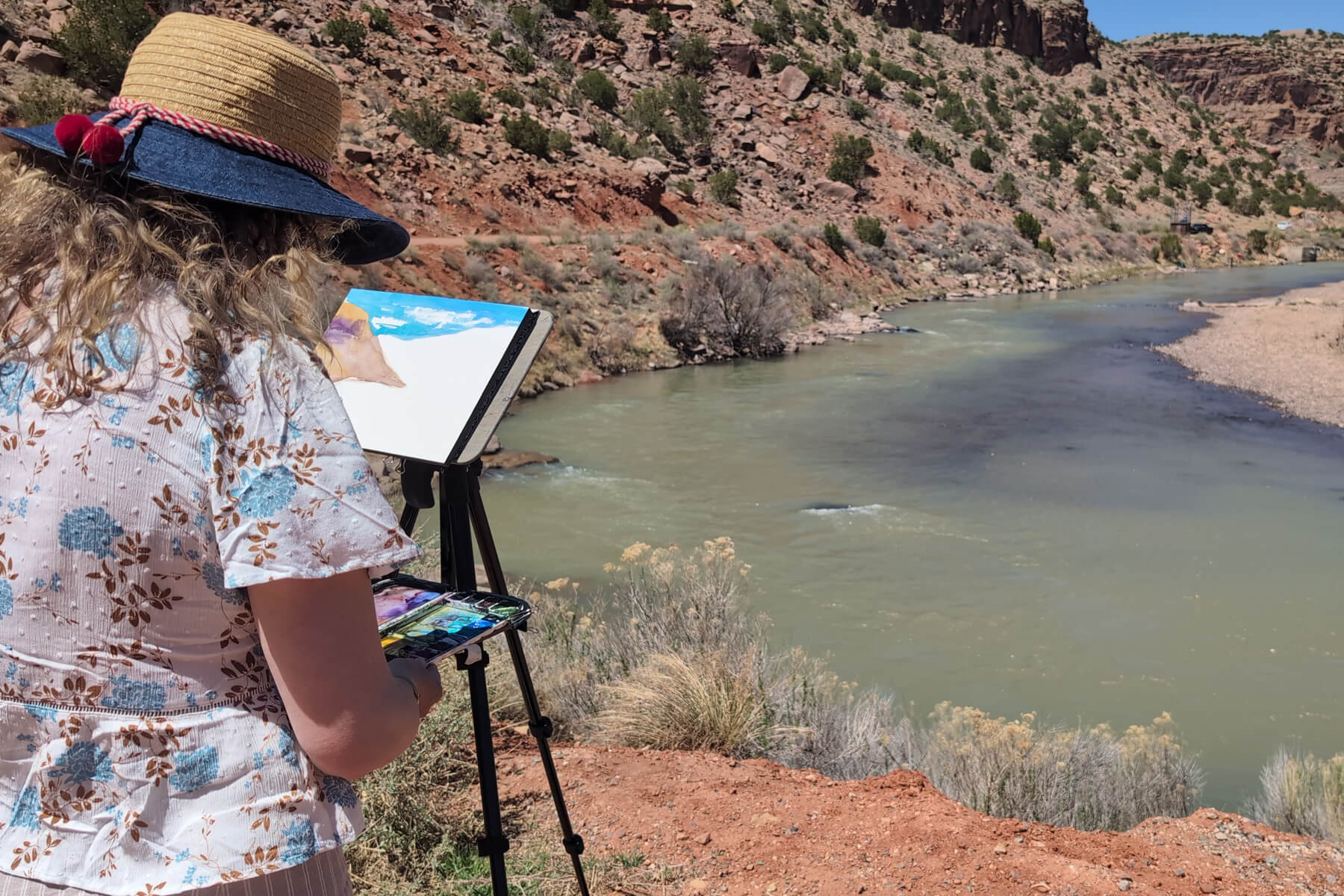Beach days. Back roads. City strolls. Create for the joy of it – then bring it back to the studio. Summer changes how we move, and how we make. Bold Adventures is about fitting creativity into that rhythm, wherever it takes you.
Join Angela Fehr, celebrated watercolour artist and creative mentor, as she invites you to paint with freedom, intuition, and bold authenticity.
Known as "The Watercolour Rebel", Angela challenges traditional rules and encourages you to embrace your own unique artistic voice.
Artist Q&A with Angela Fehr
What are your current go-to paints, brushes, and surfaces? What makes them your favourites?
I have been obsessed with Daniel Smith's Bloodstone Genuine for plein air painting. It brings a quick neutral dark to my paintings on location and has a lovely textural look that adds extra dimension.
I love a 5.5 x 8.5 inch sketchbook with 100% cotton watercolour paper, lately I've been using sketchbooks filled with Fabriano 100% cotton cold press watercolour paper.
I've been using Da Vinci Cosmotop brushes - a long round is an easy all-purpose brush to fill a page or add line.
Are there any lesser-known tools or materials you swear by that other artists might find useful?
My plein air sketches seem to come alive when I add in some sketchy mark making. I have been using General's Sketching pencils in softer 4B or 6B lead - they are like a flat carpenter's pencil so they make great broad marks.
I also love Caran d'Ache Neocolor II water-soluble crayons for drawing on my watercolour sketches; it's a playful way of inviting my inner child to contribute to the work.
How does your choice of tools support the expressive, intuitive nature of your style - do you choose materials that encourage spontaneity?
I try to create with materials and tools that I feel an affinity toward. The best advice I can give artists regarding materials is to choose materials that get you excited about creating.
There is a physicality to this that matters - your tools are the intermediary between you and your art, and so they should feel connected.
This also means that on location, I love underscoring that affinity in a tactile way - in Italy adding marks with a gelato spoon, in my backyard I might choose a twig to scrap into the paint with.
When you're painting on the go, what are the essentials you never leave home without?
I keep a go-bag with my battered travel palette (a folding palette with a rubber gasket to seal the lid), two travel brushes, a sketchbook, a few bulldog clips to secure everything, and a handful of pencils and crayons.
If I'm really pressed for space, I can pack a sketchbook, a brush and a pan of watercolour graphite. Watercolour graphite makes beautiful sketches that feel like grainy black and white photos, so evocative!
Have you come across any unexpected or unconventional tools that now feel essential when you’re painting on the go?
I had a brush tip marker in my painting kit a few years ago, and the lid came off and it dried out before I could use it. I found that I could use that marker as a brush, dipping it into the paint, and now I bring that marker on every trip as an additional travel brush!

What does a ‘bold adventure’ mean to you, as an artist?
I think it takes boldness to interpret a landscape beyond the literal. I do love wild places, travel and getting out of my comfort zone...in fact, maybe that's the key.
If I'm pushing out of my comfort zone, that's where freedom and bold adventure can be found, whether physically or in my mind and approach to the art.
Do you have any personal rituals or approaches that help you stay creatively connected while travelling, especially when routines are disrupted?
I feel like plein air/location painting is by nature disruptive. Weather, audiences, exposure, self-consciousness, all contribute to pull an artist off-kilter.
I feel like in setting up to paint, I have a little routine of how I like to lay out my materials that starts to help me focus, but mostly, I just need to dive in and find my way. Finding flow as an artist, whether in studio or out, is never something that happens immediately; it comes after you start.
Have there been any unexpected moments during your travels where art helped you connect more deeply with a place or with the people there?
I have met with so much generosity from people as an artist painting on location. Whether it's kind comments on my paintings or a conversation that allowed a stranger to share a part of their story, I have found that painting on location opens me to opportunities to receive kindness from others, and that's a pretty remarkable commonality wherever I go.
I try to look for moments of "I will regret it forever if I don't paint here now," whether on the rooftop of a cathedral in Milan or a frigid patio in Colorado, I get to make that location part of my story and experience when I see, stop and paint in that moment.
I have to add that my husband is a huge enabler here - when we travel together he is the first to say, "You should paint here," and make a point of stopping whatever we are doing to make that happen. I can be a little introverted about asking everyone to pause so I can stop and paint, and he really pushes me to take up space in this area.


How do you stay creatively open and connected to your practice while on the move, especially during a busy or unfamiliar trip?
I really try to reject urgency. If I'm traveling, I don't want to feel like I am constantly on the clock.
The first goal for travel is to find a sense of letting go of time and agendas (even though travel comes with an itinerary) and focus on the in-the-moment experience. It's okay to not take photos. It's okay to not stop to paint, even. I try to start with finding a sense of presence, being curious and open, letting go of what I expect to see, feel and experience and just experiencing it as it is.
I make space and time to process later, and trust that however it emerges, and whenever it emerges, it is going to change and inform me as an artist for the rest of my life.
What’s it like watching students immerse themselves in both art and nature during a retreat - do you see their work or confidence shift over the course of the experience?
I try to remember that these art and travel workshops are about relationship. It's such a privilege to be able to teach and paint all over the world, and I come to meet my students excited to hear their stories and encourage them in their creative practices.
I also want to give them space to find their process in their time, and so by modelling a healthy creative practice, I hope to help them find their own freedom to explore, fail and let go of the pressure to excel. When the entire group is spread out painting an inspiring view, sometimes an energy comes over the group that is so rich and intense, it's hard to describe. But we all feel the connection between us, sharing in something that we can't describe or depict, only hope to participate in in a small way.
How do you design your workshops to encourage creative exploration and a sense of adventure, even for those who may be stepping out of their comfort zones?
I try to model curiosity and openness to possibility. I think of it as "head up, say yes" mentality. In painting, we start with a plan, but the best paintings come from a willingness to adapt the plan to the painting that emerges, moment by moment in the process.
Because I model this in painting, it's also how I try to approach travel, and I find I usually attract students that model that same mindset. We definitely talk about the discomfort that often comes with this and there's a sense in which we welcome it.

For artists considering their first workshop or retreat, what advice would you give about choosing materials or approaching the experience with the right mindset?
Artists are often so hesitant to trust that what they bring to a retreat or workshop will be what they need. I really try to encourage artists to come as they are; bring the materials that you are already comfortable using to lessen the learning curve, and use great paper!
I believe that you will receive what you are ready for, so to come with a mindset of trust that the workshop will serve you well is valuable, and recognize that there is a huge value in investing in your artistic practice with a new learning experience or elevated travel experience.
Finally, the best way to prepare for a workshop is to be actively painting in the weeks and months prior to the event; you will be priming your pump with ideas, growing skill and storing up questions to ask your instructor.


